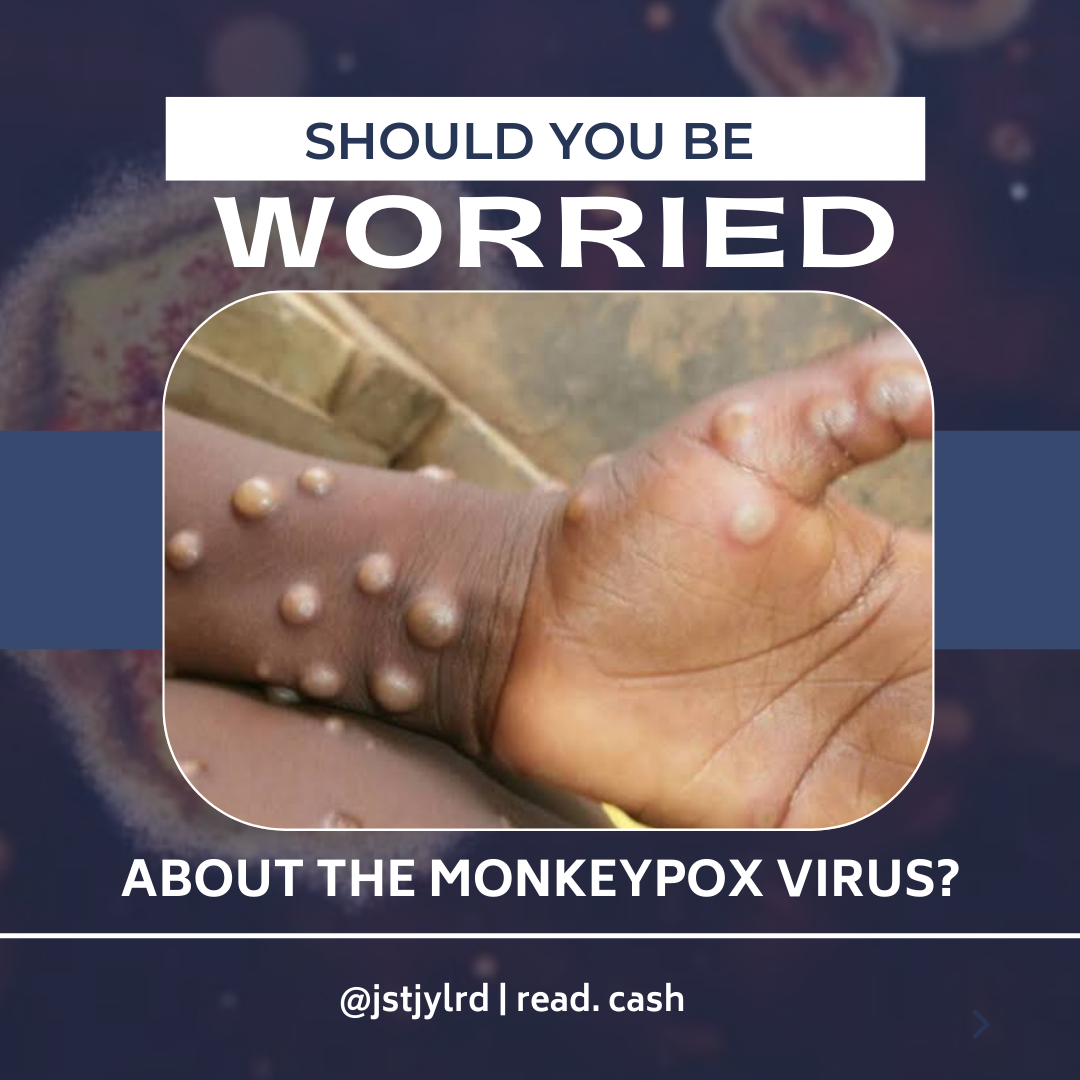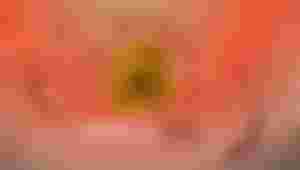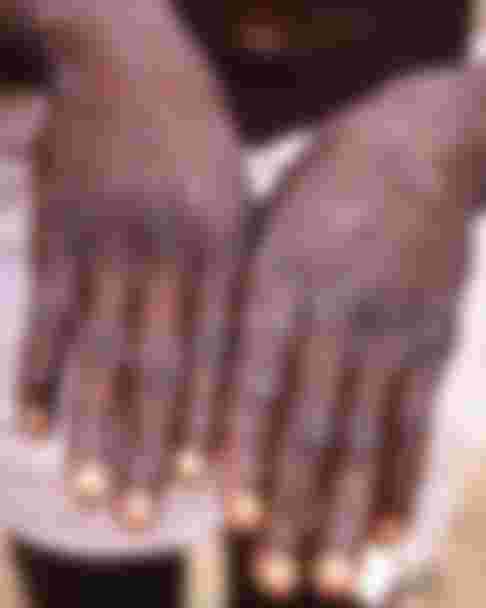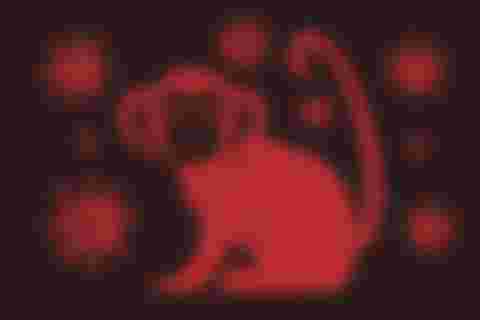Should You Be Worried About Monkeypox Virus?

Hi, fellow users and readers!
I was intrigued by the news I saw online whilst I was freely scrolling down on my feed. Another virus has been creating cacophony internationally! The fact that we still have not fully recovered from COVID-19 yet, it is so heartrending to perceive that another plague, Monekypox, is yet to devour the entire country. With a weary heart and disappointment, I rummaged the internet and here are the informations I have assimilated.
What is the Monekypox Virus?

According to World Health Organization (WHO), albeit clinically less severe than smallpox, monkeypox is a viral zoonosis (a virus that spreads from animals to people). It has symptoms that are comparable to those of smallpox.
The West African clade and the Congo Basin clade are two separate clades, or genetically related lineages, of monkeypox viruses, according to the World Health Organization (also called the Central African clade). Evidence suggests that the Congo Basin clade is more likely than the West African clade to cause severe and deadly disease and may also be more transmissible.
The WHO states that despite the name of the virus, monkeys and other nonhuman primates are probably not the pathogen's major hosts, but this has yet to be proved. Instead, it is believed that rodents represent the monkeypox virus's native natural reservoir in the wild. Although humans and other primates are susceptible to the virus, they are accidental hosts, which means they are not a permanent "reservoir" for the virus.
The Outbreak of Monkeypox Virus in History

According to the WHO, research monkeys at the Statens Serum Institute in Copenhagen, Denmark, had a pox-like ailment in 1958, which led to the discovery of monkeypox. A 9-month-old boy who lived in the Democratic Republic of the Congo was found to have the first known human case in 1970.
Benin, Cameroon, the Central African Republic, the Democratic Republic of the Congo, Gabon, Cote d'Ivoire, Liberia, Nigeria, the Republic of the Congo, Sierra Leone, and South Sudan are the 11 African nations where human cases of monkeypox have been documented since 1970.
Over 500 suspected cases, over 200 confirmed cases, and a case fatality rate of about 3 percent have been reported in Nigeria since 2017. Cases are still being reported today.
The first monkeypox outbreak outside of Africa occurred in the United States of America in 2003, and contact with pet prairie dogs that had the disease was to blame.
The 2022 Outbreak of Monkeypox Virus

Health officials in the U.K. reported numerous cases of monkeypox in London and surrounding areas, just one of which was connected to overseas travel. The number of cases in the UK. soon started to increase when officials in other European nations reported their own cases, and the first cases in Canada and the United States were discovered in mid-May.
Monkeypox started spreading at an alarming rate in non-endemic nations in 2022. Following the discovery of the first cases in London in May and the reporting of more than 16,000 cases in 75 countries and territories by mid-July, the WHO declared the epidemic a public health emergency of worldwide concern .
Signs and Symptoms of Monkeypox Virus

Monkeypox takes one to two weeks to incubate, or the time it takes for symptoms to appear after exposure. Monkeypox infections frequently begin with flu-like symptoms, such as:
Fever
Headache
Muscle pain
Fatigue
Swollen lymph nodes; this swelling can be seen in a number of places, including the armpit and neck.
Following this, the recognizable "pox" rashes start to show up, typically on the face, inside the mouth, and then on the hands, feet, and other limbs. These rashes can mirror those brought on by the Varicella zoster virus, which causes chickenpox, as well as those brought on by several STIs, including syphilis and herpes.
Fatality of the Monkeypox Virus

Comparing the Congo Basin clade to the West African clade, severe illness and mortality are associated with a higher risk. According to the UCLA Fielding School of Public Health, estimates of the case fatality rate for the West African clade range from 1 percent to 3.5 percent, whereas estimates for the Congo Basin clade range from 6 to 10 percent (opens in new tab).
The West African clade has been responsible for the 2022 outbreak. Out of more over 16,000 cases, there had been five documented deaths as of July 23, when the WHO declared the 2022 outbreak a public health emergency.
Prevention of the Monekypox Virus

Some nations have laws in place that limit the importing of non-human primates and rodents. Animals kept in captivity who might have monkeypox should be quarantined right away and kept separate from other animals. Animals that may have interacted with an infected animal need to be confined, handled with regular safety measures, and monitored for signs of monkeypox for 30 days.
Treatment for Monkeypox

Although many patients recover without the need for specialized care, there are no medications licensed especially to treat monkeypox. However, in severe cases, patients might be given antiviral drugs meant to treat other infections. For instance, they might be given tecovirimat (trade name TPOXX), a smallpox treatment that also fights off other orthopoxviruses, per the Centers for Disease Control and Prevention.
In Conclusion:
Taking into consideration the alarming cases of monkeypox virus worldwide, there's no reason for us to not be worried. Sooner or later, this monkeypox might turn out to be as worse of COVID-19. There must be ways to prevent it, yet, we still should not be confident, and, must do something to stop it for a possible exponential cases internationally. Certain actions must still be done in order to avert its massive spreading. Most importantly, we must must not wait to experience a pandemic, again.
________________________
Reference:
1.) Centers for Control Disease and Prevention. (2022, June 14). Updated Case-finding Guidance: Monkeypox Outbreak—United States 2022. Emergency Preparedness and Response. https://emergency.cdc.gov/han/2022/han00468.asp
2.) Lanese, N. (n.d). Monkeypox: Symptoms, pictures, treatments & vaccines. LiveScience. https://www.livescience.com/what-is-monkeypox-symptoms-treatment
3.) World Health Organization. (2022, May 19). Monkeypox. World Health Organization. https://www.who.int/news-room/fact-sheets/detail/monkeypox
4.) UCLA. (2022, May 26). What Do We Know – and Need to Know - About Monkeypox? Fielding School of Public Health. https://ph.ucla.edu/news/news-item/2022/may/what-do-we-know-and-need-know-about-monkeypox







I hope this virus will never go any further